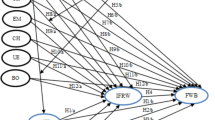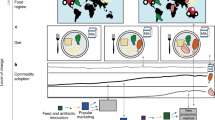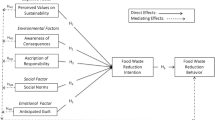Abstract
Many global food-waste frameworks do not account for multiple concurrent factors, such as culture, time, context and the aims of the stakeholders. Using the semantic tools developed in the philosophical fields of analytic metaphysics and analytic ontology, we propose a framework to explore and document the conceptual nuances of food waste. By discussing food waste from the positions of substantivalism, adjectivalism and adverbialism, we account for the breadth of food-waste contexts to improve representation and communication in technical settings dealing with identification and measurement, such as report writing and policy development.
This is a preview of subscription content, access via your institution
Access options
Access Nature and 54 other Nature Portfolio journals
Get Nature+, our best-value online-access subscription
$32.99 / 30 days
cancel any time
Subscribe to this journal
Receive 12 digital issues and online access to articles
$119.00 per year
only $9.92 per issue
Buy this article
- Purchase on SpringerLink
- Instant access to the full article PDF.
USD 39.95
Prices may be subject to local taxes which are calculated during checkout
Similar content being viewed by others
References
Hoehn, D. et al. A critical review on food loss and waste quantification approaches: is there a need to develop alternatives beyond the currently widespread pathways? Resour. Conserv. Recycl. 188, 106671 (2023).
Parfitt, J., Barthel, M. & Macnaughton, S. Food waste within food supply chains: quantification and potential for change to 2050. Phil. Trans. R. Soc. B 365, 3065–3081 (2010).
Evans, D. Food Waste. Home Consumption, Material Culture and Everyday Life (Bloomsbury, 2014).
Soma, T. (Re)framing the food waste narrative: infrastructures of urban food consumption and waste in Indonesia. Indonesia 105, 173–190 (2018).
Nicholes, M. J., Quested, T. E., Reynolds, C., Gillick, S. & Parry, A. D. Surely you don’t eat parsnip skins? Categorising the edibility of food waste. Resour. Conserv. Recycl. 147, 179–188 (2019).
Schanes, K., Dobernig, K. & Gözet, B. Food waste matters—a systematic review of household food waste practices and their policy implications. J. Clean. Prod. 182, 978–991 (2018).
Boiteau, J. M. & Pingali, P. Can we agree on a food loss and waste definition? An assessment of definitional elements for a globally applicable framework. Glob. Food Sec. 37, 100677 (2023).
Zeb, A., Soininen, J.-P. & Sozer, N. Data harmonisation as a key to enable digitalisation of the food sector: a review. Food Bioprod. Process. 127, 360–370 (2021).
Tomich, T. P. et al. Why do we need food systems informatics? Introduction to this special collection on smart and connected regional food systems. Sustainability 15, 6556 (2023).
Knorr, D. & Augustin, M. A. Preserving the food preservation legacy. Crit. Rev. Food Sci. Nutr. 63, 9519–9538 (2023).
Foellmer, J., Liboiron, M., Rechenburg, A. & Kistemann, T. How Do the Cultural Contexts of Waste Practices Affect Health and Well-Being? (World Health Organization, 2022).
Gille, Z. From the Cult of Waste to the Trash Heap of History. The Politics of Waste in Socialist and Postsocialist Hungary (Indiana Univ. Press, 2007).
Arafat, H. A., Al-Khatib, I. A., Daoud, R. & Shwahneh, H. Influence of socio-economic factors on street litter generation in the Middle East: effects of education level, age and type of residence. Waste Manag. Res. 25, 363–370 (2007).
Hoppe, T., Bressers, H., de Bruijn, T. & Franco-Garcia, L. Street litter reduction programs in the Netherlands: reflections on the implementation of the Dutch litter reduction program for 2007–2009. Lessons from a public private partnership in environmental policy. Environ. Eng. Manag. J. 12, 1657–1668 (2013).
Varzi, A. C. On the interplay between logic and metaphysics. Linguist. Philos. Investig. 8, 13–36 (2009).
Divers, J. The modal status of the Lewisian analysis of modality. Mind 123, 861–872 (2014).
Divers, J. & Fletcher, J. (Once again) Lewis on the analysis of modality. Synthese 197, 4645–4668 (2020).
Bovay, J. & Zhang, W. A century of profligacy? The measurement and evolution of food waste. Agric. Resour. Econ. Rev. 49, 375–409 (2020).
Barles, S. in The Basic Environmental History (eds Agnoletti, M. & Neri Serneri, S.) 199–226 (Springer, 2014).
Reynolds, C., Soma, T., Spring, C. & Lazell, J. (eds) The Routledge Handbook of Food Waste Parts IV and V (Routledge, 2020).
The State of Food and Agriculture 2019: Moving Forward on Food Loss and Waste Reduction (Food and Agriculture Organization of the United Nations, 2019); http://www.fao.org/3/ca6030en/ca6030en.pdf
Bellemare, M. F., Çakir, M., Peterson, H. H., Novak, L. & Rudi, J. On the measurement of food waste. Am. J. Agric. Econ. 99, 1148–1158 (2017).
Varzi, A. C. Review of André Gallois’s ‘Occasions of identity. A study in the metaphysics of persistence, change and sameness’ [Clarendon Press, Oxford, 1998]. Australas. J. Philos. 79, 291–295 (2001).
Borghini, A. The adverbial theory of properties. Metaphysica 13, 107–123 (2012).
Besnier, N. & Narotzky, S. in Indeterminacy. Waste, Value and the Imagination (eds Alexander, C. & Sanchez, A.) 181–193 (Berghahn, 2019).
Johnson, L. K. in The Routledge Handbook of Food Waste (eds Reynolds, C. et al.) 81–92 (Routledge, 2020).
Barnhill, A. & Civita, N. Food waste: ethical imperatives & complexities. Physiol. Behav. 223, 112927 (2020).
Keefe, R. Vagueness: supervaluationism. Philos. Compass 3, 315–324 (2008).
Arp, R., Smith, B. & Spear, A. D. Building Ontologies with Basic Formal Ontology (MIT Press, 2015).
Stojanov, R. et al. Food waste ontology: a formal description of knowledge from the domain of food waste. In Proc. 2019 IEEE International Conference on Big Data (Big Data) 5190–5194 (IEEE, 2019).
Dooley, D. M. et al. FoodOn: a harmonized food ontology to increase global food traceability, quality control and data integration. npj Sci. Food 2, 23 (2018).
Citizen Food Waste Attitudes and Behaviours Out of Home (Waste and Resources Action Programme, 2023); https://www.wrap.ngo/sites/default/files/2023-02/WRAP_Citizen_food_waste_attitudes_and_behaviours_out_of_home.pdf
Moynihan, C. Sharing the wealth at a dumpster divers’ feast. New York Times (27 August 2010); https://www.nytimes.com/2010/08/28/nyregion/28metjournal.html?searchResultPosition=1
Victor, B. After truck spills on highway, ‘Alfredo sauce is everywhere’. New York Times (31 August 2022); www.nytimes.com/2022/08/31/us/alfredo-sauce-truck-spill.html?smid=nytcore-ios-share&referringSource=articleShare
Matchar, E. The rise of ‘zero-waste’ restaurants. Smithsonian Magazine (16 March 2020); https://www.smithsonianmag.com/innovation/rise-zero-waste-restaurants-180974394/
Burdeau, C. Can Xylella be stopped? Olive Oil Times (4 May 2018); https://www.oliveoiltimes.com/features/can-xylella-be-stopped/62948
Do your throw away food if it has meat? Reddit https://www.reddit.com/r/vegetarian/comments/pdd802/do_your_throw_away_food_if_it_has_meat/ (2021).
Invited to a dinner party where I don’t eat the food. Reddit https://www.reddit.com/r/etiquette/comments/111ecq9/invited_to_a_dinner_party_where_i_dont_eat_the/ (2023).
Gibson, E. Maurizio Cattelan’s $120,000 banana removed from display. Dezeen https://www.dezeen.com/2019/12/09/maurizio-cattelans-120000-banana-galerie-perrotin-art-basel-miami/ (2019).
Hurst, D. Growers go bananas over waste. The Sydney Morning Herald (7 January 2010); https://www.smh.com.au/business/growers-go-bananas-over-waste-20100106-lu7q.html
About us Misfits Market https://www.misfitsmarket.com/about-us (2025).
Gold, B. The ultimate guide to storing every type of food in the refrigerator for long-lasting freshness. Real Simple https://www.realsimple.com/food-recipes/shopping-storing/food/food-waste-mistakes (2023).
Hadjikakou, M. How cutting down on junk food could help save the environment. UNSW Newsroom https://www.unsw.edu.au/newsroom/news/2016/10/how-cutting-down-on-junk-food-could-help-save-the-environment (2016).
Paudyal, R. Overeating: food waste that kills. Medium https://medium.com/talkplant/overeating-food-waste-that-kills-99248dd3052f (2019).
Khoo, A. Dining etiquette: a guide to Chinese banquets. SilverKris https://silverkris.singaporeair.com/inspiration/food-drink/restaurants/dining-etiquette-guide-chinese-banquets/ (2017).
Giles, D. B. in The Routledge Handbook of Food Waste (eds Reynolds, C. et al.) 23–36 (Routledge, 2019).
Victory in the kitchen: the recipes that kept Britain going in the Second World War. Country Life https://www.countrylife.co.uk/food-drink/victory-in-the-kitchen-easy-wartime-recipes-to-try-149921 (2017).
Makarewicz, T. Waste less—enjoy more fresh produce. OHEA https://www.ohea.on.ca/blog/waste-less-enjoy-more-fresh-produce (2013).
Wang, Y., Yuan, Z. & Tang, Y. Enhancing food security and environmental sustainability: a critical review of food loss and waste management. Resour. Environ. Sustain. 4, 100023 (2021).
Thompson, N. Ottawa urged to look into best before date system in bid to reduce grocery waste. CP24 https://www.cp24.com/news/2023/07/04/ottawa-urged-to-look-into-best-before-date-system-in-bid-to-reduce-grocery-waste/ (2023).
Karanth, S., Feng, S., Patra, D. & Pradhan, A. K. Linking microbial contamination to food spoilage and food waste: the role of smart packaging, spoilage risk assessments and date labeling. Front. Microbiol. 14, 1198124 (2023).
Messner, R., Richards, C. & Johnson, H. The ‘prevention paradox’: food waste prevention and the quandary of systemic surplus production. Agric. Hum. Values 37, 805–817 (2020).
Gooch, M. et al. The Avoidable Crisis of Food Waste Update (Second Harvest and Value Chain Management International, 2024).
Drackner, M. What is waste? To whom? An anthropological perspective on garbage. Waste Manag. Res. 23, 175–181 (2005).
Acknowledgements
A.B.’s research was supported by the European Research Council under the Grant Agreement (2025–2027): 101177427 – RELISH (Reframing European Gastronomy Legacy through Innovation, Sustainability and Heritage) – HORIZON-CL2-2024-HERITAGE-01, and by the Ministry of University and Research (MUR) under the grant schema ‘Departments of Excellence 2023-2027’, awarded to the Department of Philosophy ‘Piero Martinetti’ of the University of Milan for the Project ‘Techne’. N.P.’s research was supported by the Fundação para a Ciência e a Tecnologia under the Individual Call to Scientific Employment Stimulus - 5th Edition (number 2022.07434.CEECIND) and under the Exploratory Projects in All Scientific Domains 2023 (number 2023.12085.PEX) for the project EpiFoWa: An Epistemology of Food Waste. Interdisciplinary Perspectives. Earlier versions of this paper were presented at: the online workshop jointly organized by the RECIPES research network and Culinary Mind on 14 September 2022; the Seven Hills Workshop on Nature, Norms, and Society held at the College of the Holy Cross, USA, on 23 September 2023; and the Department of Humanistic Sciences, University of L’Aquila, Italy, on 20 November 2024. We are grateful to the participants and organizers for their valuable feedback and suggestions.
Author information
Authors and Affiliations
Contributions
A.B. and N.P. reviewed the literature, prepared and edited the paper. They selected the theoretical options presented in the paper and developed the theoretical framework.
Corresponding author
Ethics declarations
Competing interests
The authors declare no competing interests.
Peer review
Peer review information
Nature Food thanks the anonymous reviewers for their contribution to the peer review of this work.
Additional information
Publisher’s note Springer Nature remains neutral with regard to jurisdictional claims in published maps and institutional affiliations.
Rights and permissions
Springer Nature or its licensor (e.g. a society or other partner) holds exclusive rights to this article under a publishing agreement with the author(s) or other rightsholder(s); author self-archiving of the accepted manuscript version of this article is solely governed by the terms of such publishing agreement and applicable law.
About this article
Cite this article
Borghini, A., Piras, N. Semantic and philosophical approaches for advancing the identification and measurement of food waste. Nat Food 6, 547–552 (2025). https://doi.org/10.1038/s43016-025-01167-2
Received:
Accepted:
Published:
Version of record:
Issue date:
DOI: https://doi.org/10.1038/s43016-025-01167-2



